6 Key Tech Industry Insights and What They Mean for Your Business
March 28, 2023
What we are seeing in technology
As companies scale back operations to meet slowing demand, which is impacting the volume of venture capital software deals, tech industry layoffs have continued. The pandemic initially inflated online prices due to increased demand for online shopping. Now, online prices are expected to resume their deflationary path as the Fed battles to curb inflation. Within online shopping, online grocery grew significantly, and demand is expected to remain high, even as the economy slows. Yet, looking further out, the emergence of generative AI, exemplified by Microsoft’s $10 billion investment in OpenAI and the record-breaking growth of ChatGPT users, could be a significant growth driver for businesses. Additionally, the advancement of VR technology, coupled with generative AI, present a significant opportunity for e-commerce and the online real estate market.
1. Software venture capital deals continue to decline
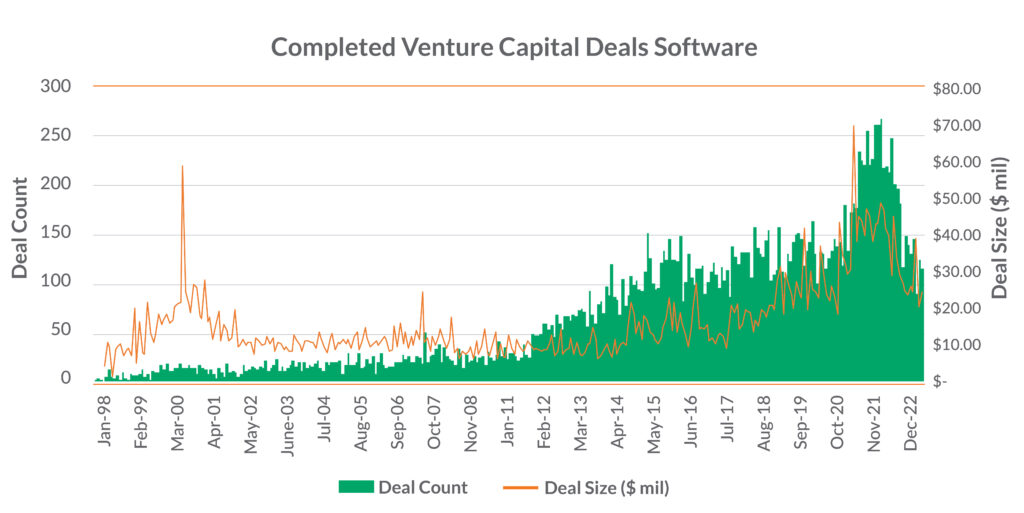
Software venture capital investments have sharply declined as post-pandemic valuations contract amid economic uncertainty. With the failure of Silicon Valley Bank, a key ally in the private technology market, financial conditions are expected to tighten and may drive exploration of non-traditional funding sources for future deals.
What this means for you: Expect lower valuations, smaller rounds and more milestone-driven terms for future funding than was common between 2020-2022. Given the uncertainty of the economy, and tighter financial conditions, focus on minimizing burn rate and executing operating objectives.
2. ChatGPT rapid growth signals promising outlook for AI
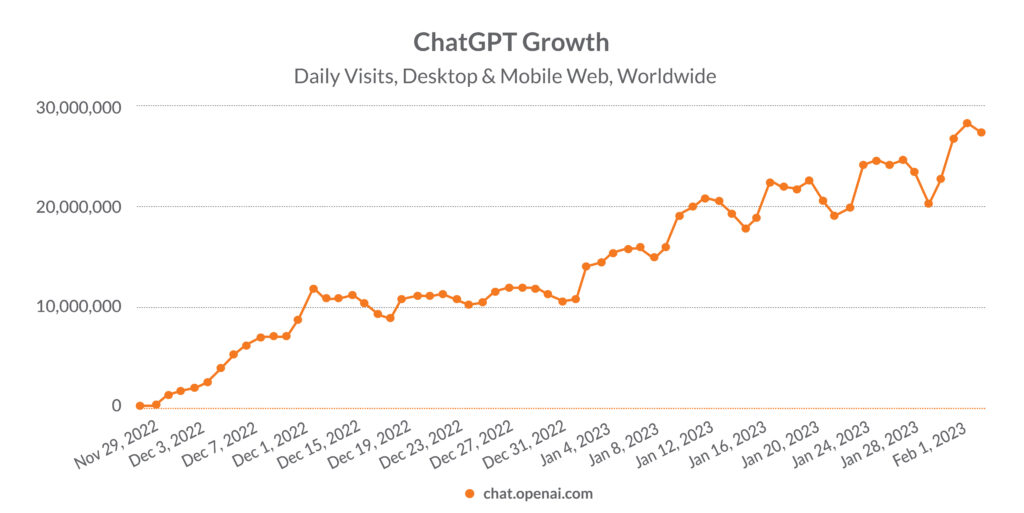
Coupled with Microsoft’s recent $10 billion investment in ChatGPT-creator OpenAI, rapid growth in ChatGPT users is a signal that generative AI could be one of the most important growth drivers of the decade. As the technology continues to advance, we can expect to see even more innovative use cases and applications of generative AI that can help businesses automate tasks, improve customer interactions, and gain insights from large amounts of data.
What this means for you: As more companies, such as Instacart, Shopify and Snap adopt the commercial use of ChatGPT, consider exploring how it can help scale operations. By integrating ChatGPT into your existing systems, you can develop more efficient and effective AI applications that can help you stay competitive.
3. AI expected to be the catalyst for greater VR adoption
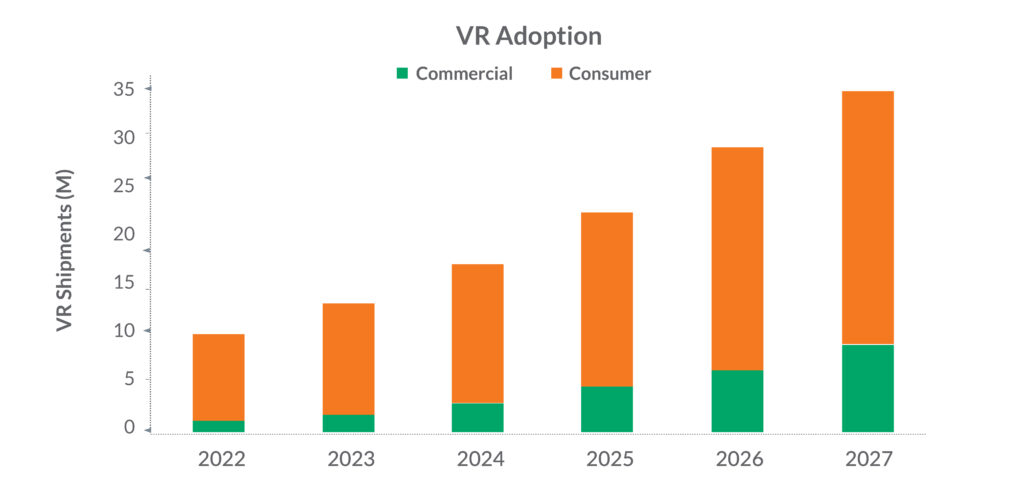
While Virtual Reality (VR) technology has been around, it has primarily functioned as a consumer application for gaming. We believe that generative AI could be a catalyst for more commercial use of VR, as businesses integrate artificial intelligence into visually-intensive processes.
What this means for you: As VR technology continues to advance and become more accessible, it presents a significant opportunity for e-commerce and the online real estate market. By leveraging the power of generative AI, businesses can create more engaging and immersive experiences for their customers, which could ultimately lead to increased revenues and customer loyalty.
4. Tech layoffs accelerate as post-pandemic adoption of technology decelerates
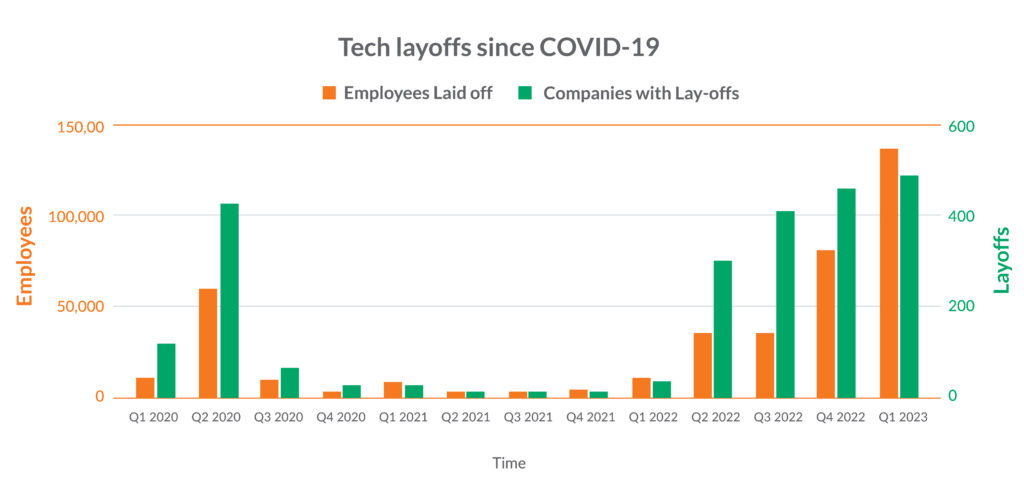
After a wave of over-hiring due to extrapolating pandemic-related demand, tech companies have scaled back their operations, and layoffs have become rampant. Since October of 2022, more than 220,000 tech workers have been laid off globally, according to layoffs.fyi.
What this means for you: With the economy expected to slow and the post-pandemic acceleration of digital technology adoption decelerating (even if temporarily), be vigilant about overhead costs. At the same time, aggressively recruit top-tier talent who may be available due to layoffs, winding down, or dissatisfaction at other companies.
5. Post-pandemic online price inflation comes to an end
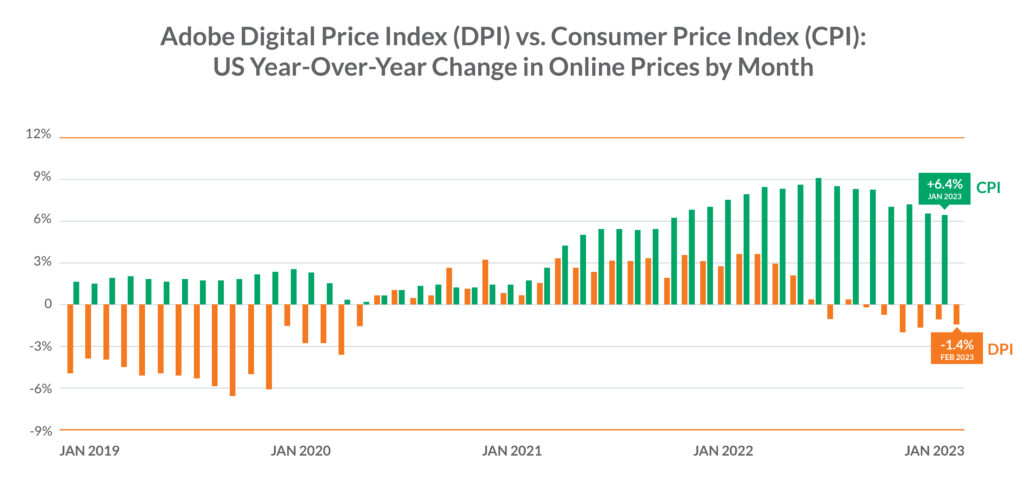
Historically, online prices were deflationary. However, quarantining during the pandemic increased demand across online shopping. Now that lives and shopping patterns are normalizing, online prices have reverted toward deflationary as the Fed’s quantitative tightening attempts to fight inflation.
What this means for you: Plan for deflationary price trends across e-commerce to continue. Online prices tend to be deflationary due to lower operating costs, lower barriers to entry, and greater competition than brick-and-mortar stores.
6. Online grocery shopping is here to stay
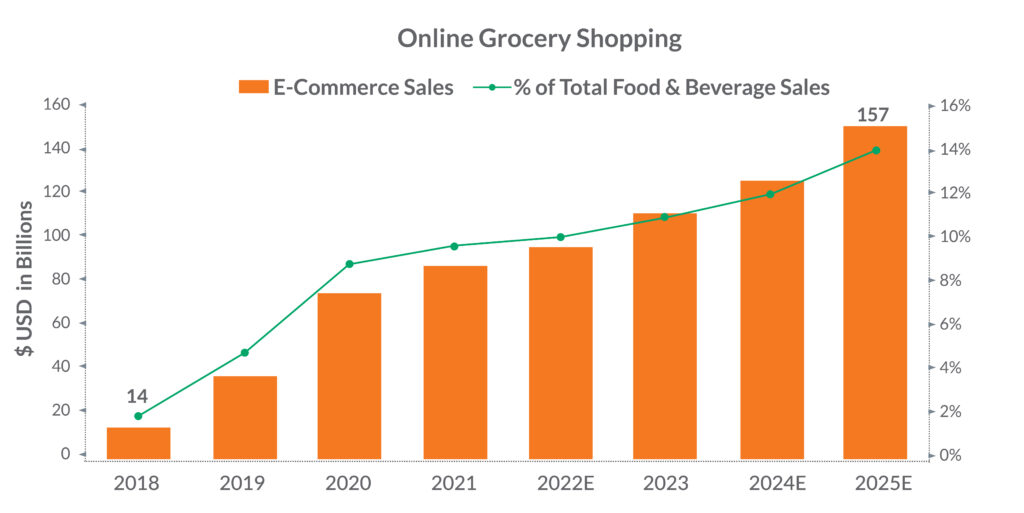
The online grocery category experienced sizable growth during the pandemic as consumers could not visit stores and restaurants. Yet even as other shopping patterns normalize, online grocery is taking market share. Penetration is expected to increase 40% to 14% of total grocery sales, or $152 billion, by 2025.
What this means for you: Prices, demand patterns and supply chains differ with online grocery shopping compared to in-store. With expected growth rates online, contour your business to meet this channel of the market.
Disclosures
Investment advisory services are offered by Aprio Wealth Management, LLC, a Securities and Exchange Commission Registered Investment Advisor. Opinions expressed are as of the current date (March 28, 2023) and subject to change without notice. Aprio Wealth Management, LLC shall not be responsible for any trading decisions, damages, or other losses resulting from, or related to, the information, data, analyses or opinions contained herein or their use, which do not constitute investment advice, are provided as of the date written, are provided solely for informational purposes and therefore are not an offer to buy or sell a security. This commentary is for informational purposes only and has not been tailored to suit any individual. References to specific securities or investment options should not be considered an offer to purchase or sell that specific investment.
This commentary contains certain forward-looking statements. Forward-looking statements involve known and unknown risks, uncertainties and other factors which may cause the actual results to differ materially and/or substantially from any future results, performance or achievements expressed or implied by those projected in the forward-looking statements for any reason.
No graph, chart, or formula in this presentation can be used in and of itself to determine which securities to buy or sell, when to buy or sell securities, whether to invest using this investment strategy, or whether to engage Aprio Wealth Management, LLC’s investment advisory services.
Investments in securities are subject to investment risk, including possible loss of principal. Prices of securities may fluctuate from time to time and may even become valueless. Any securities mentioned in this commentary are not FDIC-insured, may lose value, and are not guaranteed by a bank or other financial institution. Before making any investment decision, investors should read and consider all the relevant investment product information. Investors should seriously consider if the investment is suitable for them by referencing their own financial position, investment objectives, and risk profile before making any investment decision. There can be no assurance that any financial strategy will be successful.
Securities offered through Purshe Kaplan Sterling Investments. Member FINRA/SIPC. Investment Advisory Services offered through Aprio Wealth Management, LLC, a registered investment advisor. Aprio Wealth Management, LLC and the Aprio Group of Companies are not affiliated with Purshe Kaplan Sterling Investments.
Recent Articles
About the Author
Mitchell Kopelman
National Leader in Aprio’s Technology Practice, and Tax Partner, Mitchell works with SaaS companies in FinTech, HealthTech, Transaction Processing, Blockchain and Gaming. Whether a company is pre-revenue, starting up, growing, or preparing for a liquidity event, Mitchell works with them to maximize their potential at each stage. He is known for promoting research, innovation and entrepreneurship by enabling companies to be successful, regardless of where they are in their business lifecycle.
(404) 898-8231
Simeon Wallis
Simeon Wallis, CFA, is a Partner, the Chief Investment Officer of Aprio Wealth Management, and the Director of Aprio Family Office. Each month, Simeon brings you insights from the financial markets in Aprio’s Pulse on the Economy. To discuss these ideas and how they may affect your current investment strategy, schedule a consultation.
Stay informed with Aprio.
Get industry news and leading insights delivered straight to your inbox.


